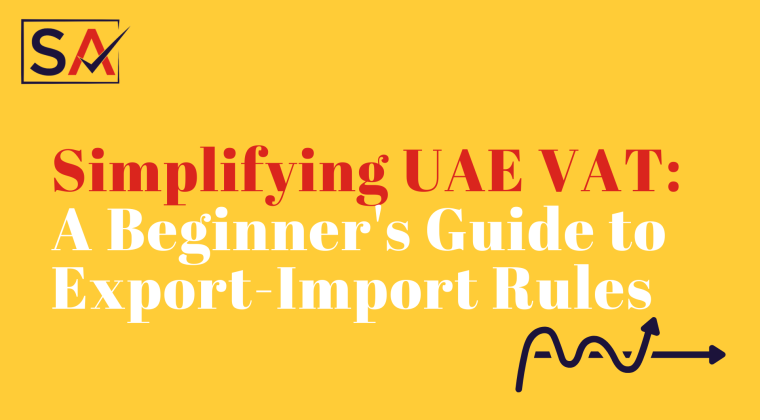In this blog, we will learn about UAE VAT Law pertaining to export-import rules.
Export rules for goods
As per Article 45 of the Federal Decree-Law No. 8 of 2017 on Value Added Tax, any direct or indirect export of the goods from the UAE or other GCC implementing states to outside the states will be treated as zero-rated, if it meets the conditions specified in the executive regulation of the UAE VAT Law.
What is Direct Export?
Direct exports are the export of goods to a location outside of the UAE, where the supplier is responsible for arranging transport or appointing an agent to do so on his behalf.
The Direct Export shall be subject to the zero rate if the following conditions are met:
- The Goods are physically exported to a place outside the Implementing States or are put into a customs suspension regime in accordance with GCC Common Customs Law within 90 days of the date of the supply.
- Official and commercial evidence of Export or customs suspension is retained by the exporter.
“Movement of Goods into a Designated Zone from a place in the State or a supply of Goods to a Designated Zone shall not be considered an Export of those Goods”.
What is an Indirect Export?
Indirect exports are the export of goods to a location outside of the UAE, where the overseas customer is responsible for arranging the collection of the Goods from the supplier in the UAE and who exports the Goods himself or has appointed an agent to do so on his behalf.
An Indirect Export shall be subject to the zero rate if the following conditions are met:
- The Goods are physically exported to a place outside the Implementing States or are put into a customs suspension within 90 days of the date of the supply under an arrangement agreed by the supplier and the Overseas Customer at or before the date of supply
- The Overseas Customer obtains official and commercial evidence of Export or customs suspension in accordance with GCC Common Customs Law, and provides the supplier with a copy of this.
- The Goods are not used or altered in the time between supply and Export or customs suspension, except to the extent necessary to prepare the Goods for Export or customs suspension.
- The Goods do not leave the State in the possession of a passenger or crew member of an aircraft or ship.
Documents required to prove exports
- Official Evidence
- “Official evidence” means Export documents issued by the local Emirate Customs Department in respect of Goods leaving the State. This includes Commercial invoices, Customs documents and Exit certificates.
- Commercial Evidence
Commercial evidence shall include any of the following:
- Airway bill.
- Bill of lading.
- Consignment note.
- Certificate of shipment.
“If any of the above mentioned documents are missing, then the taxable person is deemed as failed to prove the exports and accordingly, needs to charge 5% VAT on the supply”.
The evidence obtained as proof of Export, whether official or commercial, must identify the following:
- The supplier
- The consigner
- The goods
- The value
- The export destination
- The mode of transport
Practical examples
- A company in Abu Dhabi exports goods worth AED 100,000 to its customer in India by sea. The company obtains and retains the commercial invoice; customs export declaration and bill of lading from its clearing agent. Can the company treat this export as zero-rated?
Under UAE VAT law, the company must obtain both official and commercial evidence for the export of goods to prove them for zero rating for VAT purposes. In this case, the company has a customs export declaration and bill of lading and also, a commercial invoice. With this, we cannot say that the official evidence criteria are met.
As per the FTA guidelines, the company must retain the documents issued by the customs authority confirming the export like an exit certificate for considering as official evidence. Hence, in this case, the transaction cannot be treated as zero-rated due to lack of official evidence and should charge VAT at the standard rate of 5%.
- A company in Dubai exports goods worth AED 100,000 to its customers in India through logistics agents who will consolidate goods from different sellers and ship them together. The logistic agent prepared the official and commercial documents in consolidated value of all goods and does not provide separate documents to the company, then the company cannot consider them as zero-rated due to the unavailability of the official and commercial evidence to prove the export.
- Sometimes, companies who exports the goods may take help from freight forwarding or logistics companies like FedEx or Aramex etc. It may not be possible to obtain the official and commercial evidences. In such a case, the companies cannot treat those exports as zero rated. They should consider those transactions as standard rate of 5%.
Import of goods
If goods or services arrive in the UAE from a place located outside the UAE, then the supply is called an Import. Generally, VAT will due on the import of goods and services and the registrant has to account VAT under reverse charge mechanism (RCM).
How import VAT should be paid, and the timing of payment, is dependent on the status of the importer.
Imports by non-registered persons
Where the import is made by an individual or a business which is not registered for VAT in the UAE, VAT is due to be paid in respect of the import at the point of importation. As such, VAT must be paid before the goods are released to the importer.
- Import VAT is calculated on the value of the goods inclusive of any customs duty and excise tax that may also be due.
- Payment of VAT will need to be made directly to the FTA, separately from any payments which are due to the Customs authorities (for example, customs duties).
- VAT payment will be made to the FTA using the FTA’s payment portal. Once the VAT is paid, the importer will be able to proceed with the customs clearing process in respect of the goods.
Import through Logistics or courier companies
- It should be noted that where an unregistered person imports goods using a VAT-registered agent, such as a courier company, the agent will be responsible for paying import VAT to the FTA on behalf of the unregistered person.
- This agent needs to account for the relevant import VAT on their tax return, and is not able to recover the VAT accounted for as input tax.
- The agent will also be required to issue a statement to the unregistered importer with details of the import and the VAT paid.
Imports by VAT registered persons
- Where the import is made by a VAT registered person, the import VAT should be accounted for on the person’s tax return using the reverse charge mechanism. As a consequence, a VAT registered person may clear the goods through customs and be able to use the goods in the UAE even before the import VAT is accounted for to the FTA.
Imports by VAT-registered persons
To benefit from the ability to defer the payment of VAT in this way, the importer must:
- be able to demonstrate that they are registered for VAT at the time of import of the goods and;
- provide the FTA with their own Customs registration number issued by the competent Customs authority for that import
- Where the payment of the import VAT is accounted for on the tax return, the VAT-registered importer must declare the import VAT as output tax in the tax return covering the period of importation.
- the importer may also recover the import VAT incurred as input tax in their tax return. Where the business is entitled to recover the input tax in full, this import VAT will not represent a cost to the business.
“The Goods will not be treated as imported into the UAE if they are imported from outside the UAE to a UAE designated free zone”.

How Spectrum Auditing can help you with VAT?
Spectrum Auditing can assist you with any query on VAT with the help of a dedicated team of VAT experts. We will review your transactions from the point of view of VAT laws and guide you in rectifying any non-compliance-related issues. We are happy to assist you in providing our professional services to make sure your business is complying with the provisions of the VAT law and minimize the errors and omissions so that your business is ready for any audits from the government authorities.
Being a pioneer in the field of auditing, accounting, taxation and advisory services, we ensure we keep track of all the changes that are taking place in the UAE with respect to the changes in laws, rules, regulations and keep our clients informed as well as sharing the same information through our blog section or social media handles regularly. Spectrum Auditing will guide you with the laws and regulations of UAE, be it the Value Added Tax (VAT), Economic Substance Regulations (ESR), Corporate Tax (CT), Transfer Pricing (TP), Ultimate Beneficiary Owner (UBO), Anti Money Laundering (AML), etc after reviewing your business.
Call us today for any kind of assistance at +971 4 2699329 or email [email protected] to get all your queries addressed. Spectrum is your partner in your success.



 contact us
contact us